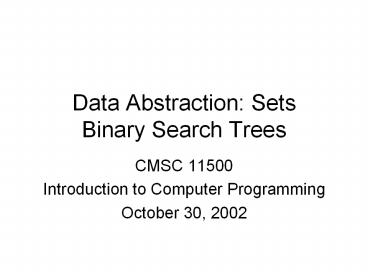Data Abstraction: Sets Binary Search Trees - PowerPoint PPT Presentation
Title:
Data Abstraction: Sets Binary Search Trees
Description:
Data Abstraction: Sets. Binary Search Trees. CMSC 11500. Introduction to Computer Programming ... Data abstraction:Sets. Objects as functions:Member-of?, Adjoin, ... – PowerPoint PPT presentation
Number of Views:19
Avg rating:3.0/5.0
Title: Data Abstraction: Sets Binary Search Trees
1
Data Abstraction SetsBinary Search Trees
- CMSC 11500
- Introduction to Computer Programming
- October 30, 2002
2
Roadmap
- Recap Binary Trees
- Data abstractionSets
- Objects as functionsMember-of?, Adjoin,
Intersection - Implementations Binary Search Trees
- Data Definition
- Invariants
- Template
- Functions
- Analysis Efficiency
- Summary
3
Recap Binary Trees
- Binary trees
- (Multiply) self-referential structures
- Data Definition -gt Template -gt Function
- (define-struct bt (val left right))
- Where val number left, right binary-tree
- A binary-tree 1) unknown,
- 2) (make-bt val left right)
- (define (fn-for-bt abt)
- (cond ((eq? abt f))
- ((bt? abt)
- (cond ((bt-val abt))
- .(fn-for-bt
(bt-left abt)) - .(fn-for-bt
(bt-right abt))
4
Data Abstraction Sets
- Set collection of objects
- Defined by operations that can be performed
- Set operations
- Element-of?, Adjoin, Union, Intersection, Set
difference - Many possible concrete implementations
- Unordered lists
- Ordered lists
- Binary trees
- Binary search trees
5
Data Definition
- Binary search tree (bst) is
- f or,
- (make-bt val left right)
- Where val number left, right bst
- (define-struct bt (val left right))
- Invariant
- For a node n, the bt-vals of all nodes in
(bt-left n) are less than (bt-val n) and all node
values in (bt-right n) are greater.
6
Data Invariants
- invariant if it is true of the input, must be
true of the output - Invariant must be maintained by all functions
that operate on the type - E.g. adjoin new element must be gt anything to
its left, lt than anything to its right
7
Template
(define (fn-for-bst abst) (cond ((eq? abst
f)..) ((bt? abst) (cond ((
bt-val abst)) (fn-for-bst (bt-left
abst)).. (fn-for-bst (ft-right abst))
8
Sets as Binary Search Trees
- 3,5,6,7,9,11,13
- Balanced same nodes in left right
- Unbalanced anything else
7
5
11
3
6
9
13
9
Element-of?
- Contract
- element-of? number bst -gt boolean
- Purpose
- To determine if element is in set
10
Element-of?
(define (element-of? num abst) (cond ((eq?
abst f) f) ((bt? abst) (cond (( num
(bt-val abst)) t) ((lt num (bt-val
abst)) (element-of? num (bt-left abst)))
((gt num (bt-val abst)) (element-of? num
(bt-right abst)))))
11
Adjoin
- Contract
- adjoin number bst -gt bst
- Purpose
- To create a new set with members of original
set and new element
12
Adjoin BST
(define (adjoin x abst) (cond ((null? abst)
(make-bt x f f) (( x (bt-val abst))
abst) ((lt x (bt-val abst)) (make-bt
(bt-val abst) (adjoin x (bt-left abst))
(bt-right abst))) ((gt x (bt-val abst))
(make-bt (bt-val abst) (bt-left abst)
(adjoin x (bt-right abst))))
13
Intersection BST
- Contract
- intersection bst bst -gt bst
- Purpose
- To build a set including items found in both
sets
14
Intersection
(define (intersection bst1 bst2) (intersect-iter
bst1 bst2 f) (define (intersect-iter bst1 bst2
bst-new) (cond ((or (not bst1)(not bst2))
bst-new) ((element-of? (bt-val bst2)
bst1) (intersect-iter (bt-right bst2) bst1
(intersect-iter (bt-left bst2) bst1 (adjoin
(bt-val bst2) bst-new) (else (intersect-iter
(bt-right bst2) bst1 (intersect-iter
(bt-left bst2) bst1 bst-new)
15
BST Sets
- Analysis
- If balanced tree
- Each branch reduces tree size by half
- Successive halving -gt O(log n) growth
- Element-of? O(log n)
- Adjoin O(log n)
16
Summary
- Data objects
- Defined by operations done on them
- Abstraction
- Many possible implementations of operations
- All adhere to same contract, purpose
- Different implications for efficiency
17
Alternative Ordered Lists
- Set-of-numbers
- 1) ()
- 2) (cons n set-of-numbers)
- Where n is a number, and n lt all numbers in son
- Maintain constraint
- Anywhere add element to set
18
Adjoin
(define (adjoin x set) (cond ((null? set) (cons x
()) ((eq? (car set) x) set) ((lt x (car set))
(cons x set)) (else (cons (car set)
(adjoin x (cdr set)))))) Note New invariant
adds condition Order of Growth On average,
check half































